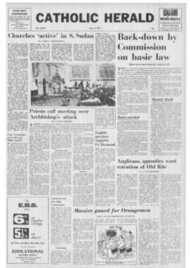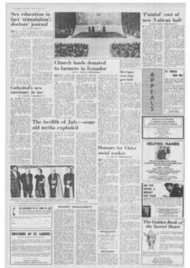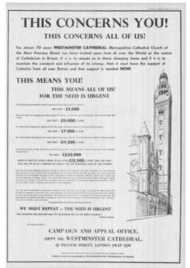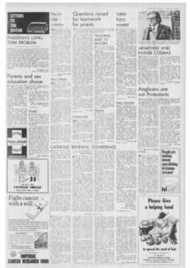Page 4, 9th July 1971
Page 4

Report an error
Noticed an error on this page?If you've noticed an error in this article please click here to report it.
Tags
Share
Related articles
Stevas Mistaken
Hans Kung & The Infallible Church
C.t.s. Shops Not To Handle Hans Kling Book
Infallibility Or Indestructibility?
The Wrong Tone Of This Stevas Article
Book censorship
by Norman St. Joh n Stevas
IT has become known this 1week that a number of Catholic bookshops have declined to stock Dr. Hans Kting's latest book "Infallible? An Inquiry." I understand that the book has been withdrawn from sate at the Westminster Cathedral bookshop following representations to Cardinal Heenan from some members of the laity (the new inquisitors?) and the General Secretary of the Catholic Truth Society has announced that the book will not be on sale in any of the C.T.S. bookshops. "It does not come within the objects of the C.T.S.." declared the Secretary, "which is to spread knowledge of the Catholic Faith." This situation needs to be examined further.
First a form of censorship is being imposed by a minority on the majority and one which is far from negligible. There are it is true few Catholic bookshops but Catholics naturally go to them to obtain books on religious topics. Why should they be deprived of the opportunity of reading a serious book because Mr. Thomas Rittner or indeed anyone else disapproves of its conclusions? Such repressive action would have been commonplace enough before the liberation of Vatican It but surely it is anachronistic today? Even the Vatican has abolished the Index of Forbidden Books. Having got rid of that central absurdity is it now to be replaced by local variants?
The second point to make is that the suppression is being
exercised not over a valueless pornographic work, such as would incur the righteous wrath of Lord Longford, but over a major contribution to theological thought by a writer with a world-wide reputation. Dr. Kung, by his previous works on the Church and Faith has achieved for himself a recognised place amongst the theologians of our time. His books have been read by Catholics all over the world, why now should an attempt be made in England, of all countries, to deprive Catholics of the opportunity to read his latest contribution?
The book which has been suppressed by Mr. Rittner and others has been widely reviewed in the secular and religious press (I myself have reviewed it in the Sunday Times); it has been the subject of two profound articles by Bishop Butler published in our distinguished contemporary The Tablet; it has been the focus of comment not only in Britain but in France. Germany, Italy and the United States. In these circumstances what, other than to cause irritation, is the purpose of this puny local ban?
Mr. Rittner justifies his action by stating that the book "does not come within the objects of the C.T.S. which is to spread knowledge of the Catholic Faith." One point to make here is that for many years secular books which have nothing at all to do with any faith, Catholic or otherwise, have been obtainable from C.T.S. bookshops. Another, and more important. is that Catholic truth is not spread only by the dissemination of the opinions of those who keep within the narrow confines of current orthodoxies but by those who move out from their safe shelter to stimulate thought and inquiry about the truths of the Faith.
Dr. lating indicates this purpose in his book which is subtitled "An Inquiry." It is quite clear from reading the hook that Dr. lating does not imagine that he has said the final word on the subject: he is writing to stimulate to illtther thought and is attempting to move the discussion of infallibility out of the neo scholastic categories within which it has been confined for a century into a more biblical and historical setting. This is as much a service to the spreading of Catholic truth as any of the pamphlets published by the C.T.S.
My final' point is this The faith of childreo may well require protection hut that or adults must be able to face up to challenges wherever they may come from. Those who wish to buy "infallible? An Inquiry" at a price of £2.25 arc not likely to he attending nursery school or kindergarten or even grammar school. They will be those with a mature knowledge of their religion who wish to extend it further and keep abreast of the theological development of the time.
The gesture of banning this book is accordingly hoth in
appropriate and ineffective_ Those who want to read it will go to a secular bookshop and obtain it there. The banning gesture must be seen for what it is. an act of psychological intolerance, refusing to allow the free circulation of ideas which is the lifeblood of the intellectual life be it in religious or secular matters.
It is especially sad to see this being made in the alleged defence of Catholic Truth. Truth appeals through its own intrinsic quality and does not need to he bolstered-up by bans. Catholic means universal. 'Me Catholic Church is not a species of super sect: it is the Universal Church, the main body of Christians. which should be capable of containing within itself diverse opinions on a wide variety of matterS.
So it was in the Medieval Church which despite popular misconceptions enjoyed much more freedom of theological inquiry than its 1'ridentine successor. Freedom and tolerance are not marks of weakness hut of strength. Catholics should be grateful to Hans Kling for the courage and integrity of his intellectual and Christian witness and should be more concerned to discuss his ideas rather than to push them under the bookshop counter or out of the bookshop door.
Fortunately for all of us the market-place of thought is open to all and these silly and intolerant stratagems are hound to fail.
blog comments powered by Disqus









